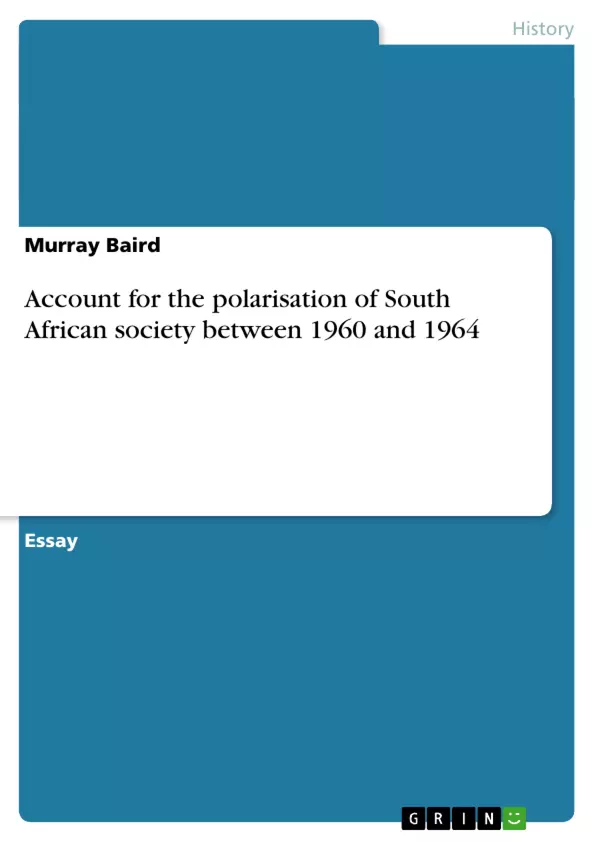Apartheid and Resistance in South Africa, 1948 – 1994
Any account of the polarisation of African society into distinct white and black polarities, on the right and left wings of the political spectrum respectively, between 1960 and 1964 must be considered in the light of pre-existing relationships between whites and non-whites in South Africa, which manifested themselves in microcosm with events at Sharpeville on 21 March 1960. Critical to the discussion will be the role played by the National Party government, particularly relating to the creation of the Republic of South Africa in 1961, withdrawal from the Commonwealth of Nations in the same year, the 1961 General Election and the government’s racial policy. The function of the United Party, as the party of Official opposition, will also be scrutinised, together with the role of the Liberal Party and the Progressive Party. Analysis of the ideologies of the African resistance movements, including the African National Congress, with Umkhonto we Sizwe, and the Pan-Africanist Congress, with Poqo, will further reveal reasons for the adoption of extreme opposing attitudes. Moreover, these diametric attitudes were subjected to influence from, and response to, international events both within Africa and globally.
Inhaltsverzeichnis (Table of Contents)
- Events at Sharpeville
- The Role of the National Party Government
- The Role of the United Party, the Liberal Party and the Progressive Party
- Analysis of the Ideologies of the African Resistance Movements
Zielsetzung und Themenschwerpunkte (Objectives and Key Themes)
This essay analyzes the polarization of South African society between 1960 and 1964, focusing on the events at Sharpeville and their impact on both white and black communities. It investigates the role of political parties, the ideologies of African resistance movements, and the influence of international events in shaping this period of social unrest.
- The Impact of Sharpeville on South African Society
- The Role of Political Parties in Shaping Racial Tensions
- The Evolution of African Resistance Movements and their Strategies
- The Influence of International Events on South African Politics
Zusammenfassung der Kapitel (Chapter Summaries)
The essay begins by examining the events at Sharpeville in 1960, highlighting the pre-existing tensions between whites and non-whites in South Africa. The author argues that Sharpeville was not an isolated incident but rather a culmination of years of government repression and African national protest.
The essay then explores the role of the National Party government in creating the Republic of South Africa, withdrawing from the Commonwealth, and implementing its racial policy. The author also examines the responses of the United Party, the Liberal Party, and the Progressive Party to these developments.
The final section delves into the ideologies of the African resistance movements, including the African National Congress and the Pan-Africanist Congress. The author examines the factors leading to the adoption of increasingly extreme attitudes by both groups.
Schlüsselwörter (Keywords)
This essay focuses on the key themes of apartheid, resistance, political polarization, racial tensions, and the impact of Sharpeville. It examines the roles of various political parties, including the National Party, the United Party, the Liberal Party, and the Progressive Party. Key figures discussed include Hendrik Verwoerd, Oliver Tambo, and Nelson Mandela. The essay also explores the ideologies of the African National Congress and the Pan-Africanist Congress, their strategies for resistance, and the influence of international events.
Frequently Asked Questions
What caused the polarization of South African society between 1960 and 1964?
The polarization was driven by the National Party's apartheid policies, the creation of the Republic in 1961, and the escalating resistance from black movements following the Sharpeville massacre.
What happened at Sharpeville on 21 March 1960?
The Sharpeville massacre was a turning point where police opened fire on peaceful protesters, leading to international condemnation and a shift toward armed struggle in the resistance.
Who were the main African resistance movements during this period?
The African National Congress (ANC) with its wing Umkhonto we Sizwe, and the Pan-Africanist Congress (PAC) with Poqo were the leading forces.
What role did the National Party government play?
Led by Hendrik Verwoerd, the government intensified racial segregation, withdrew from the Commonwealth, and suppressed political opposition through harsh legislation.
How did international events influence South African politics?
Decolonization across Africa and global Cold War dynamics influenced both the government's fears and the resistance movements' strategies and support systems.
Who were the key political figures discussed in the essay?
Key figures include Hendrik Verwoerd (National Party), Oliver Tambo and Nelson Mandela (ANC).
- Arbeit zitieren
- Murray Baird (Autor:in), 2007, Account for the polarisation of South African society between 1960 and 1964, München, GRIN Verlag, https://www.hausarbeiten.de/document/203304


